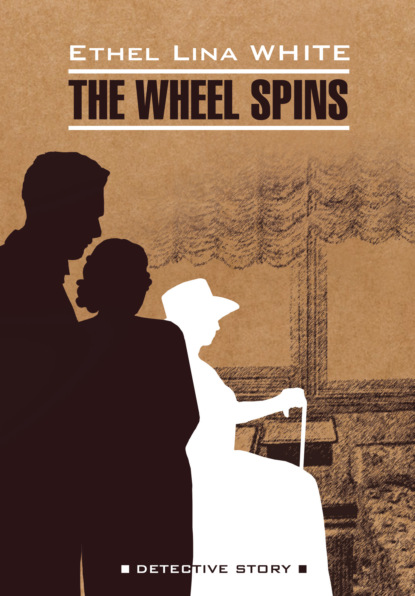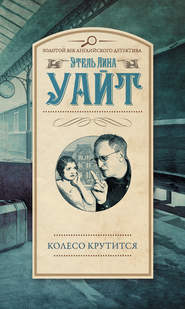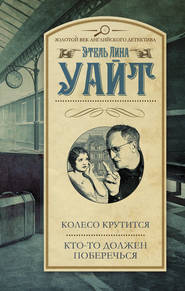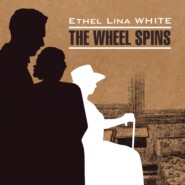По всем вопросам обращайтесь на: info@litportal.ru
(©) 2003-2025.
✖
Колесо крутится. Леди исчезает / The Wheel Spins. The Lady Vanishe
Настройки чтения
Размер шрифта
Высота строк
Поля
With a cry, she snatched it from him. Remembering the crowd on the platform, she had no hope of finding her money; but there was a faint chance that her passport had not been stolen.
She tore at the zip-fastener with shaking fingers, to find, to her utter amazement, that the contents were intact. Tickets, money, passport – even her receipted hotel-bill, were still there.
She had grossly maligned the native honesty, and she hastened to make amends. Here, at last, was a situation she understood. As usual, some one had come to her rescue, true to the tradition of the protective square in her palm. Her part, which was merely to overpay for services rendered, was easy.
The women received their share of the windfall with stolid faces. Apparently they were too stunned with astonishment to show excitement or gratitude. The old porter, on the other hand, beamed triumphantly and gripped Iris’ suitcase, to show that he, too, had grasped the situation.
In spite of her resistance to it, the raw spirit, together with her change of circumstance, had revived Iris considerably. She felt practically restored again and mistress of herself as she showed her ticket to the porter.
The effect on him was electric. He yammered with excitement, as he grabbed her arm and rushed with her to the door. Directly they had passed through it, Iris understood the origin of the curious pervading noise which had’ helped to complicate her nightmare.
It was the gush of steam escaping from an engine. While she had let the precious minutes slip by, the express had entered the station.
Now it was on the point of departure.
The platform was a scene of wild confusion. Doors were being slammed. People were shouting farewells and crowding before the carriages. An official waved a flag and the whistle shrilled.
They were one minute too late. Iris realised the fact that she was beaten, just as the porter – metaphorically snatched at the psychological moment, and was swung away with it on its flight. He took advantage of the brief interval between the first jerk of the engine and the revolution of the wheels to charge the crowd, like an aged tiger.
There was still strength and agility in his sinewy old frame to enable him to reach the nearest carriage and wrench open the door.
His entrance was disputed by a majestic lady in black. She was a personage to whom – as a peasant – his bones instinctively cringed. On the other hand, his patron had paid him a sum far in excess of what he earned in tips during the whole of a brief season.
Therefore, his patron must have her place. Ducking under the august lady’s arm, he hurled Iris’ suitcase into the compartment and dragged her inside after it.
The carriage was moving when he scrambled out, to fall in a heap on the platform. He was unhurt, however, for when she looked back to wave her thanks, he grinned at her like a toothless gnome.
Already he was yards behind. The station slid by, and the lake began to lap against the piles of the rough landing-stage. It rippled past the window in a sheet of emerald, ruffled by the breeze and burnished by the sun. As the train swung round the curve of the rails to the cutting in the rocks, Iris looked back for a last view of the village – a fantastic huddle of coloured toy-buildings, perched on the green shelf of the valley.
Chapter seven. Passengers
As the train rattled out of the cliff tunnel and emerged in a green tree-choked gorge, Iris glanced at her watch. According to the evidence of its hands, the Trieste express was not yet due at the village station.
“It must have stopped when I crashed,” she decided. “Sweet luck. It might have lost me my train.”
The reminder made her feel profoundly grateful to be actually on her way back to England. During the past twenty four hours she had experienced more conflicting emotion than in a lifetime of easy circumstance and arrangement. She had known the terrifying helplessness of being friendless, sick and penniless – with every wire cut. And then, at the worst, her luck had turned, as it always did.
From force of contrast the everyday business of transport was turned into a temporary rapture. Railway travel was no longer an infliction, only to be endured by the aid of such palliatives as reservations, flowers, fruit, chocolates, light literature, and a group of friends to shriek encouragement.
As she sat, jammed in an uncomfortable carriage, in train which was not too clean, with little prospect of securing a wagon-lit at Trieste, she felt the thrill of a first journey.
The scenery preserved its barbarous character in rugged magnificence. The train threaded its way past piled-up chunks of disrupted landscape, like a Doré steel-engraving of Dante’s Inferno. Waterfalls slashed the walls of granite precipices with silver-veining. Sometimes they passed arid patches, where dark pools, fringed with black-feathered rushes, lay in desolate hollows.
Iris gazed at it through the screen of the window – glad of the protective pane of glass. This grandeur was the wreckage a world shattered by elemental-force, and reminded her it she had just been bruised by her first contact with reality.
She still shrank from the memory of first facts, even although the nightmare railway station was the thick of the mountain away. Now that it was slipping farther behind the coils of the rails with every passing minute, she could dare to estimate the narrow margin by which she had escaped disaster.
Amid the crowd at the station there must have been a percentage of dishonest characters, ready to take advantage of the providential combination of an unconscious foreigner – who did not count – and an expensive handbag which promised a rich loot. Yet the little gnome-like porter chanced to the man on the spot.
“Things always do turn out for me,” she thought. “But – it must be appalling for some of the others.”
It was the first time she had realised the fate of those unfortunates who had no squares in their palms. If there were railway accident, she knew that she would be in the un-wrecked middle portion of the train, just as inevitably as certain other passengers were doomed to be in the telescoped coaches.
As she shuddered at the thought, she glanced idly at the woman who sat opposite to her. She was a negative type in every respect – middle-aged, with a huddle of small indefinite features, and vague colouring. Someone drew a face and then rubbed it nearly out again. Her curly hair was faded and her skin was bleached to oatmeal.
She was not sufficiently a caricature to suggest a stage spinster. Even her tweed suit and matching hat were not too dowdy, although lacking any distinctive note.
In ordinary circumstances, Iris would not have spared her second glance or thought. Today, however, she gazed at her with compassion.
“If she were in a jam, no one would help her out,” she thought.
It was discomforting to reflect that the population of the globe must include a percentage of persons without friends, money, or influence; nonentities who would never be missed, and who would sink without leaving a bubble.
To distract her thoughts, Iris tried to look at the scenery again. But the window was now blocked by passengers, who were unable to find seats, so stood in the corridor. For the first time, therefore, she made a deliberate survey of the other occupants of her compartment.
They were six in number – the proper quota – which she had increased to an illegal seven. Her side was occupied by a family party – two large parents and one small daughter of about twelve.
The father had a shaven head, a little waxed moustache, and several chins. His horn-rimmed glasses and comfortable air gave him the appearance of a prosperous citizen. His wife had an oiled straight black fringe, and bushy eyebrows which looked as though they had been corked. The child wore babyish socks, which did not match her adult expression. Her hair had apparently been set, after a permanent wave, for it was still secured with clips.
They all wore new and fashionable suits, which might have been inspired by a shorthand manual. The father wore stripe – the mother, spots – and the daughter, checks. Iris reflected idly that if they were broken up, and reassembled, in the general scramble, they might convey a message to the world in shorthand.
On the evidence, it would be a motto for the home, for they displayed a united spirit, as they shared a newspaper. The mother scanned the fashions; the little girl read the children’s page; and from the closely-printed columns Iris guessed that the head of the family studied finance.
She looked away from them to the opposite side of the carriage. Sitting beside the tweed spinster was a fair pretty girl, who appeared to have modelled herself from the photograph of any blonde film actress. There were the same sleek waves of hair, the large blue eyes – with supplemented lashes, and the butterfly brows. Her cheeks were tinted and her lips painted to geranium bows.
In spite of the delicacy of her features, her beauty was lifeless and standardised. She wore a tight white suit, with high black satin blouse, while her cap, gauntlet-gloves and bag were also black. She sat erect and motionless, holding a rigid pose, as though she were being photographed for a “still.”
Although her figure was reduced almost to starvation-point, she encroached on the tweed spinster’s corner, in order to leave a respectful gap between herself and the personage had opposed Iris’ entrance.
There was no doubt that this majestic lady belonged to the ruling classes. Her bagged eyes were fierce with pride, and her nose was an arrogant beak. Dressed and semi-veiled in heavy black, her enormous bulk occupied nearly half the seat.
To Iris’ astonishment, she was regarding her with a fixed stare of hostility. It made her feel both guilty and self-conscious.
“I know I crashed the carriage,” she thought. “But she’s got plenty of room. Wish I could explain, for my own satisfaction.”
Leaning forward, she spoke impulsively to the personage.
“Do you speak English?”
Apparently the question was an insult, for the lady closed heavy lids with studied insolence, as though she could not endure a plebeian spectacle.
Iris bit her lip as she glanced at the other passengers. The family party kept their eyes fixed on their paper – the tweed spinster smoothed her skirt, the blonde beauty stared into space. Somehow, Iris received an impression that this well-bred unconsciousness was a tribute of respect to the personage.
“Is she the local equivalent to the sacred black bull?” she wondered angrily. “Can’t any one speak until she does?…Well, to me, she’s nothing but a fat woman with horrible kid gloves.”
She tried to hold on to her critical attitude, but in vain. An overpowering atmosphere of authority seemed to filtrate from the towering black figure.
Now that her excitement was wearing off, she began to feel the after-effects of her slight sunstroke. Her head ached and back of her neck felt as stiff as though it had been reinforced by an iron rod. The symptoms warned her to be careful. With the threat of illness still hanging over her, she knew she should store up every scrap of nervous force, and not waste her reserves in fanciful dislikes.
She tore at the zip-fastener with shaking fingers, to find, to her utter amazement, that the contents were intact. Tickets, money, passport – even her receipted hotel-bill, were still there.
She had grossly maligned the native honesty, and she hastened to make amends. Here, at last, was a situation she understood. As usual, some one had come to her rescue, true to the tradition of the protective square in her palm. Her part, which was merely to overpay for services rendered, was easy.
The women received their share of the windfall with stolid faces. Apparently they were too stunned with astonishment to show excitement or gratitude. The old porter, on the other hand, beamed triumphantly and gripped Iris’ suitcase, to show that he, too, had grasped the situation.
In spite of her resistance to it, the raw spirit, together with her change of circumstance, had revived Iris considerably. She felt practically restored again and mistress of herself as she showed her ticket to the porter.
The effect on him was electric. He yammered with excitement, as he grabbed her arm and rushed with her to the door. Directly they had passed through it, Iris understood the origin of the curious pervading noise which had’ helped to complicate her nightmare.
It was the gush of steam escaping from an engine. While she had let the precious minutes slip by, the express had entered the station.
Now it was on the point of departure.
The platform was a scene of wild confusion. Doors were being slammed. People were shouting farewells and crowding before the carriages. An official waved a flag and the whistle shrilled.
They were one minute too late. Iris realised the fact that she was beaten, just as the porter – metaphorically snatched at the psychological moment, and was swung away with it on its flight. He took advantage of the brief interval between the first jerk of the engine and the revolution of the wheels to charge the crowd, like an aged tiger.
There was still strength and agility in his sinewy old frame to enable him to reach the nearest carriage and wrench open the door.
His entrance was disputed by a majestic lady in black. She was a personage to whom – as a peasant – his bones instinctively cringed. On the other hand, his patron had paid him a sum far in excess of what he earned in tips during the whole of a brief season.
Therefore, his patron must have her place. Ducking under the august lady’s arm, he hurled Iris’ suitcase into the compartment and dragged her inside after it.
The carriage was moving when he scrambled out, to fall in a heap on the platform. He was unhurt, however, for when she looked back to wave her thanks, he grinned at her like a toothless gnome.
Already he was yards behind. The station slid by, and the lake began to lap against the piles of the rough landing-stage. It rippled past the window in a sheet of emerald, ruffled by the breeze and burnished by the sun. As the train swung round the curve of the rails to the cutting in the rocks, Iris looked back for a last view of the village – a fantastic huddle of coloured toy-buildings, perched on the green shelf of the valley.
Chapter seven. Passengers
As the train rattled out of the cliff tunnel and emerged in a green tree-choked gorge, Iris glanced at her watch. According to the evidence of its hands, the Trieste express was not yet due at the village station.
“It must have stopped when I crashed,” she decided. “Sweet luck. It might have lost me my train.”
The reminder made her feel profoundly grateful to be actually on her way back to England. During the past twenty four hours she had experienced more conflicting emotion than in a lifetime of easy circumstance and arrangement. She had known the terrifying helplessness of being friendless, sick and penniless – with every wire cut. And then, at the worst, her luck had turned, as it always did.
From force of contrast the everyday business of transport was turned into a temporary rapture. Railway travel was no longer an infliction, only to be endured by the aid of such palliatives as reservations, flowers, fruit, chocolates, light literature, and a group of friends to shriek encouragement.
As she sat, jammed in an uncomfortable carriage, in train which was not too clean, with little prospect of securing a wagon-lit at Trieste, she felt the thrill of a first journey.
The scenery preserved its barbarous character in rugged magnificence. The train threaded its way past piled-up chunks of disrupted landscape, like a Doré steel-engraving of Dante’s Inferno. Waterfalls slashed the walls of granite precipices with silver-veining. Sometimes they passed arid patches, where dark pools, fringed with black-feathered rushes, lay in desolate hollows.
Iris gazed at it through the screen of the window – glad of the protective pane of glass. This grandeur was the wreckage a world shattered by elemental-force, and reminded her it she had just been bruised by her first contact with reality.
She still shrank from the memory of first facts, even although the nightmare railway station was the thick of the mountain away. Now that it was slipping farther behind the coils of the rails with every passing minute, she could dare to estimate the narrow margin by which she had escaped disaster.
Amid the crowd at the station there must have been a percentage of dishonest characters, ready to take advantage of the providential combination of an unconscious foreigner – who did not count – and an expensive handbag which promised a rich loot. Yet the little gnome-like porter chanced to the man on the spot.
“Things always do turn out for me,” she thought. “But – it must be appalling for some of the others.”
It was the first time she had realised the fate of those unfortunates who had no squares in their palms. If there were railway accident, she knew that she would be in the un-wrecked middle portion of the train, just as inevitably as certain other passengers were doomed to be in the telescoped coaches.
As she shuddered at the thought, she glanced idly at the woman who sat opposite to her. She was a negative type in every respect – middle-aged, with a huddle of small indefinite features, and vague colouring. Someone drew a face and then rubbed it nearly out again. Her curly hair was faded and her skin was bleached to oatmeal.
She was not sufficiently a caricature to suggest a stage spinster. Even her tweed suit and matching hat were not too dowdy, although lacking any distinctive note.
In ordinary circumstances, Iris would not have spared her second glance or thought. Today, however, she gazed at her with compassion.
“If she were in a jam, no one would help her out,” she thought.
It was discomforting to reflect that the population of the globe must include a percentage of persons without friends, money, or influence; nonentities who would never be missed, and who would sink without leaving a bubble.
To distract her thoughts, Iris tried to look at the scenery again. But the window was now blocked by passengers, who were unable to find seats, so stood in the corridor. For the first time, therefore, she made a deliberate survey of the other occupants of her compartment.
They were six in number – the proper quota – which she had increased to an illegal seven. Her side was occupied by a family party – two large parents and one small daughter of about twelve.
The father had a shaven head, a little waxed moustache, and several chins. His horn-rimmed glasses and comfortable air gave him the appearance of a prosperous citizen. His wife had an oiled straight black fringe, and bushy eyebrows which looked as though they had been corked. The child wore babyish socks, which did not match her adult expression. Her hair had apparently been set, after a permanent wave, for it was still secured with clips.
They all wore new and fashionable suits, which might have been inspired by a shorthand manual. The father wore stripe – the mother, spots – and the daughter, checks. Iris reflected idly that if they were broken up, and reassembled, in the general scramble, they might convey a message to the world in shorthand.
On the evidence, it would be a motto for the home, for they displayed a united spirit, as they shared a newspaper. The mother scanned the fashions; the little girl read the children’s page; and from the closely-printed columns Iris guessed that the head of the family studied finance.
She looked away from them to the opposite side of the carriage. Sitting beside the tweed spinster was a fair pretty girl, who appeared to have modelled herself from the photograph of any blonde film actress. There were the same sleek waves of hair, the large blue eyes – with supplemented lashes, and the butterfly brows. Her cheeks were tinted and her lips painted to geranium bows.
In spite of the delicacy of her features, her beauty was lifeless and standardised. She wore a tight white suit, with high black satin blouse, while her cap, gauntlet-gloves and bag were also black. She sat erect and motionless, holding a rigid pose, as though she were being photographed for a “still.”
Although her figure was reduced almost to starvation-point, she encroached on the tweed spinster’s corner, in order to leave a respectful gap between herself and the personage had opposed Iris’ entrance.
There was no doubt that this majestic lady belonged to the ruling classes. Her bagged eyes were fierce with pride, and her nose was an arrogant beak. Dressed and semi-veiled in heavy black, her enormous bulk occupied nearly half the seat.
To Iris’ astonishment, she was regarding her with a fixed stare of hostility. It made her feel both guilty and self-conscious.
“I know I crashed the carriage,” she thought. “But she’s got plenty of room. Wish I could explain, for my own satisfaction.”
Leaning forward, she spoke impulsively to the personage.
“Do you speak English?”
Apparently the question was an insult, for the lady closed heavy lids with studied insolence, as though she could not endure a plebeian spectacle.
Iris bit her lip as she glanced at the other passengers. The family party kept their eyes fixed on their paper – the tweed spinster smoothed her skirt, the blonde beauty stared into space. Somehow, Iris received an impression that this well-bred unconsciousness was a tribute of respect to the personage.
“Is she the local equivalent to the sacred black bull?” she wondered angrily. “Can’t any one speak until she does?…Well, to me, she’s nothing but a fat woman with horrible kid gloves.”
She tried to hold on to her critical attitude, but in vain. An overpowering atmosphere of authority seemed to filtrate from the towering black figure.
Now that her excitement was wearing off, she began to feel the after-effects of her slight sunstroke. Her head ached and back of her neck felt as stiff as though it had been reinforced by an iron rod. The symptoms warned her to be careful. With the threat of illness still hanging over her, she knew she should store up every scrap of nervous force, and not waste her reserves in fanciful dislikes.









